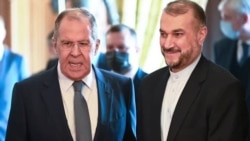On October 6, the Iranian state news outlet Press TV published a story on a meeting in Moscow between Iranian Foreign Minister Hossein Amir-Abdollahian and his Russian counterpart Sergei Lavrov. The Iranian minister accused Israel of attempting to make geopolitical changes in the South Caucasus region.
“The Islamic Republic of Iran is deeply concerned by Israel’s presence in the Caucasus,” Amir-Abdollahian was quoted as saying.
According to Press TV, he said that Tehran “will not accept a map change in the region.”
Amir-Abdollahian reportedly asked the Russians to be “sensitive” to “any potential changes to borders” in the region, and accused “the Zionist regime” of unspecified “moves” to threaten peace and stability in the region, Press TV reported.
Those comments are misleading. If anyone is changing maps in the region, it is Iran’s partner Russia.
For more than a decade, Russian troops have occupied two breakaway regions of Georgia, Abkhazia and South Ossetia. This occupation became more overt since the 2008 war between Georgia and Russia. In more recent years, Russian forces in the areas have edged deeper into Georgian territory by moving border fences. Some have called this practice “creeping occupation.”
Amir-Abdollahian’s reference to Israel appears to be related to an unfounded accusation that Azerbaijan hosted Israeli Defense Forces (IDF) during military exercises held near Iran’s border.
On October 4, Azerbaijani officials denied that any Israeli troops were present during those exercises, which included personnel from Turkey and Pakistan. Azerbaijan’s president, Ilham Aliyev, criticized the Iranian military for holding drills along the Azerbaijani-Iranian border on October 1.
Tensions between Azerbaijan and Iran have risen since the most recent conflict over the Nagorno-Karabakh area in 2020. Azerbaijan used advanced weapons systems purchased from Israel against the unrecognized Armenian-held enclave, retaking some of Nagorno-Karabakh’s territory, including a swath along Iran’s border.
Azerbaijan has repeatedly accused Iran of trafficking arms to the Armenian rebels in Nagorno-Karabakh, charges which Iran steadfastly denied. More recently, Azerbaijan imposed a “road tax” on Iranian truck drivers traveling to Armenia through the territory in Nagorno-Karabakh recovered by Azerbaijan. The tax irked Iranian officials.
Russia, which supplies weapons to both Armenia and Azerbaijan, was also accused of assisting Armenian rebels in Nagorno-Karabakh.
Although Azerbaijan was criticized for its conduct during the most recent Nagorno-Karabakh conflict, the territory is internationally recognized as part of Azerbaijan.
The same cannot be said for the parts of Georgia occupied by Russia.






